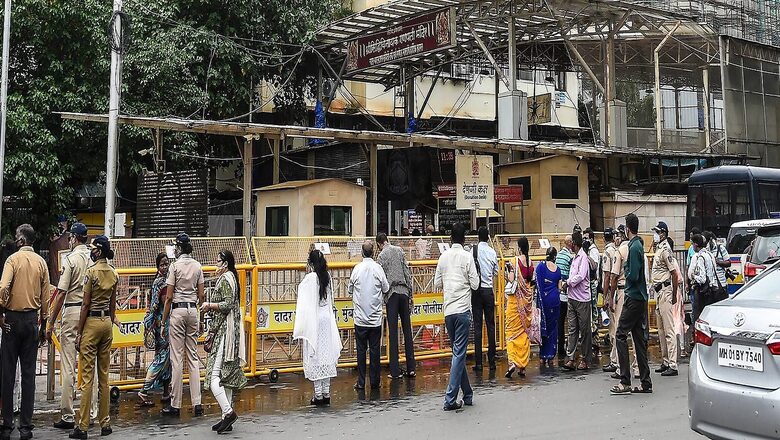
views
After two cases of the new Omicron variant were confirmed in Karnataka on Thursday, states across the country have been directed to remain vigilant and ramp up their preparedness against a possible splurge in Covid-19 cases.
Following the Health Ministry’s confirmation of two males testing positive for the new strain, India became the 30th country in the world to report what has been termed as “highly-mutated” strain by the World Health Organisation. Here’s how states are bracing for the new challenge with new guidelines:
Karnataka
Karnataka on Friday updated its Covid-19 guidelines based on recommendations by the technical advisory committee, after two males aged 66 and 44 tested positive for the new variant on Thursday. As per the new guidelines, no cultural activities and functions can take place in the state till January 15, 2022 in all educational institutions. The guidelines also make it mandatory for parents of students aged below 18 to be vaccinated with both doses. Malls, theatres and cinema halls will also only allow those who are fully vaccinated. Attendance for all gatherings, including meetings and conferences has been limited to 500. The organisers will be held responsible for ensuring Covid-appropriate behaviour in such gatherings, the new mandates say. All government servants will now be mandatorily inoculated with both doses of the Covid-19 vaccine.
Uttar Pradesh
The Uttar Pradesh government on Friday decided to intensify screening and strengthened surveillance at the state borders. Sources told News18 that the state government has asked officials to further improve surveillance with a focus on airports to ensure that normalcy prevails in the state.
In a proactive move in view of rising cases of omicron variant in other countries, Chief Minister Yogi Adityanath has also instructed the authorities to intensify genome sequencing of Covid-19 samples. As per the directives issued by him, the genome sequencing of samples is being carried out at Lucknow’s KGMU and PGI at a rapid pace. The authorities have also been asked to continue extensive cleanliness, sanitisation and fogging drives to prevent the spread of other diseases. The facilities of genome sequencing are available in the BHU, CDRI, IGIB, Ram Manohar Lohia Institute and the NBRI in the state. The process of genome testing is being done at the BHU, KGMU, CDRI and the IGIB.
Delhi
The Delhi government has made RT-PCR tests mandatory for all passengers arriving from countries identified by the Centre as “at-risk” category nations. They include European nations, the UK, South Africa, Botswana, Brazil, China, Mauritius, New Zealand, Zimbabwe, Singapore, Hong Kong and Israel. Children under the age of five won’t have to undergo Covid-19 tests unless they show symptoms for the virus.
The Delhi airport authority has made adequate arrangements, including setting up of multiple counters for Covid tests, to ensure that fliers don’t face inconvenience. The cost of the Rapid PCR test has been slashed from ₹ 3,900 to ₹ 3,500. Those undergoing the RT-PCR test will have to shell out ₹ 500, the authorities said. “We have made sitting arrangements for 1,400 people keeping in mind Covid protocols. Currency exchange counters have been opened up to help those who have difficulty paying by card. Please note that Delhi airport is the first in the country to have a dedicated lab. Multiple counters have been opened for tests,” a Delhi airport authority was quoted as saying by NDTV.
Maharashtra
The state government has made it compulsory for all international travellers to produce details of their travel over the last 15 days before boarding the flight to Mumbai or any transport means to arrive in any of the districts of the state. Those arriving from “at-risk” countries have to be de-planed on priority and will have separate counters for checking, the state advisory said.
The guidelines also make institutional quarantine mandatory for passengers coming from “at-risk” countries with a stipulation for additional RT-PCR tests on the second, fourth and seventh days. Those found positive will be moved to hospitals. Even in the case of a negative result, the passengers will have to be in home quarantine for seven days. The RT-PCR tests will be conducted for passengers coming from non-risk countries as well and in case of a positive result, they will be shifted to a hospital. A negative Covid-19 report will mean they will have to stay in home quarantine for 14 days. The domestic passengers must either be fully vaccinated or show a negative test report for Covid-19. The test should have been done not before 48 hours of travel, the new mandate says.
Gujarat
Gujarat is bracing for the new strain by extending the night curfew between 1 am and 5 am in eight cities for 10 days. These cities are Gandhinagar, Ahmedabad, Surat, Vadodara, Rajkot, Jamnagar, Bhavnagar and Junagadh. The state government has said that commercial establishments such as APMCs, shops and beauty salons can remain open in these cities till 12 am and restaurants can stay open with 75 per cent capacity till midnight.
A maximum of 100 persons have been allowed to be part of funeral processions and 400 can participate in wedding ceremonies, religious functions and political gatherings. Movie halls, however, can operate at 100 per cent capacity as long as they follow Covid-19 safety norms, the guidelines say.
West Bengal
The Covid-19 restrictions in the state have been extended till December 31 and a night curfew has been announced from 11 pm to 5 am till the end of December. Relaxations have been given for essential services.
Read all the Latest India News here




















Comments
0 comment